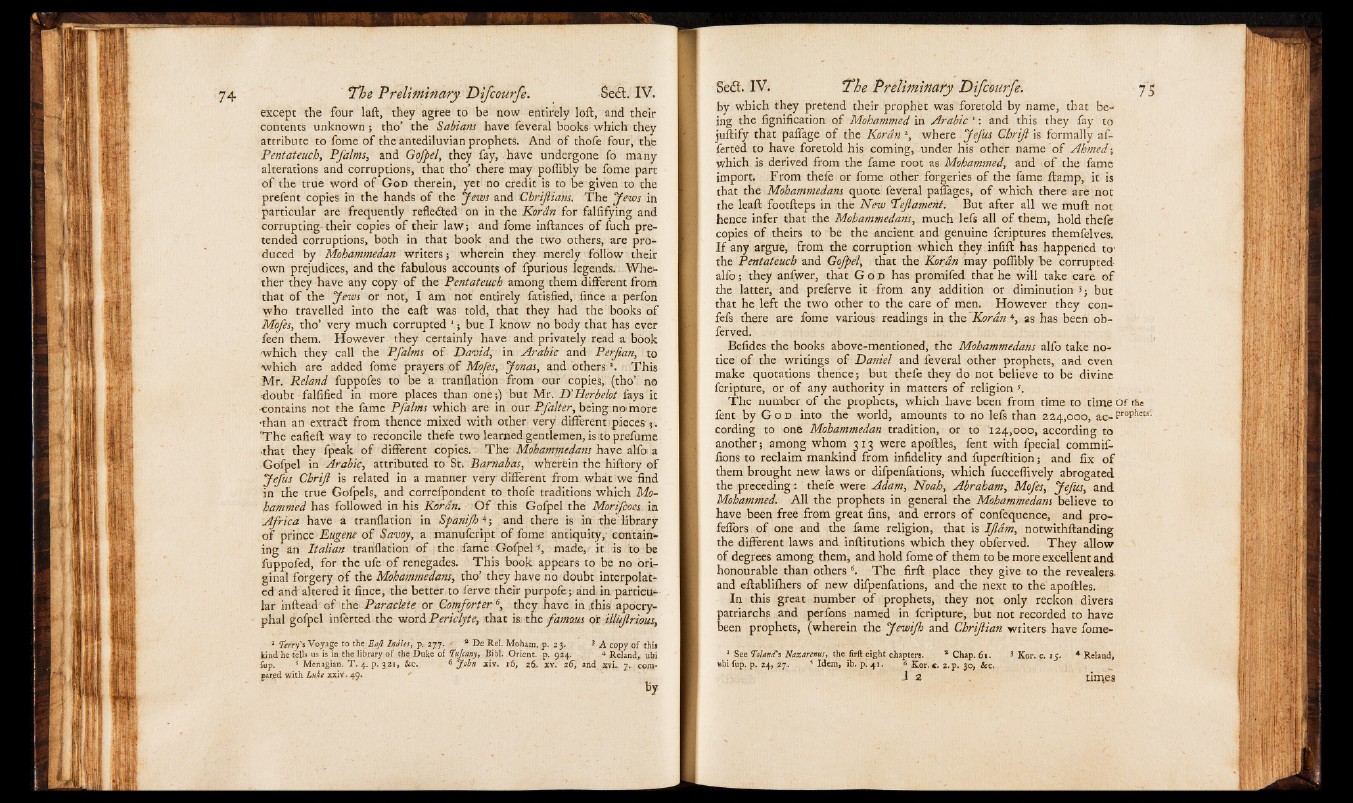
except the four laft, they agree to be now entirely loft, and their
contents unknown; tho’ the Sabians have feveral books which they
attribute to fome of the antediluvian prophets. And of thofe four, the
Pentateuch, Pfalms, and Gofpel, they fay, have undergone fo many
alterations and corruptions, that tho’ there may poffibly be fome part
of the true word of G od therein, yet no credit is to be given to the
prefent copies in the hands of the Jews and Chrifians. The Jews in
particular are frequently reflected on in the Koran for falsifying and
corrupting- their copies of their law; and fome inftances of fuch pretended
corruptions, both in that book and the two others, are produced
by Mohammedan writers; wherein they merely follow their
own prejudices, and the fabulous accounts of fpurious legends. Whether
they have any copy of the Pentateuch among them different from
that of the Jews or not, I am not entirely fatisfied, fince a perfon
who travelled into the eaft was told, that they had the books of
Mofes, tho’ very much corrupted '; but I know no body that has ever
feen them. However they certainly have and privately read a book
•which they call the Pfalms of David, in Arabic and Perjian, to
which are added fome prayers of Mofes, Jonas, and. others *. This
Mr. Reland fuppofes to be a tranflation from our copies, (tho’ no
•doubt falfified in more places than one;) but Mr. D ’Her helot fays it
•contains not the fame Pfalms which are in. our Pfalter, being-no1 * more
•than an extradl from thence mixed with other very different pieces ;.
'The eafieft way to reconcile thefe two learned gentlemen, isito prefume
■ that they fpeak of different copies. The Mohammedans have alfo a
Gofpel in Arabic, attributed to St. Barnabas, wherein the hiftory of
Jefus Chrijl is related in a manner very different from what we find
in the true Gofpels, and correfpondent to thofe traditions which Mohammed
has followed in his Koran. O f this Gofpel thé Morifcoes in
Africa have a tranflation in Spanifh 4; and there is in the library
o f prince Eugene of Savoy, a manufcript of fome antiquity,- containing
an Italian tranflation of the: fame Gofpel V made,, it is to be
fuppofed, for the ufe of renegades. This book appears to be no original
forgery of the Mohammedans, tho’ they have no doubt interpolated
and altered it fince, the better.to ferve their purpofe; and in particular
inftead of the Paraclete or Comforter 6, they have in .this apocryphal
gofpel inferted the word Periclyte, that is. the famous or illitfirious,
1 Terry"s Voyage to ths Eaft Indies t p. 277« * a De Rel. Moham. p. 23. 3 A copy of this
kind he tells us is in the library of the Duke of Tu/eany, Bibl. .Orient, p. 924. 4 Reland,, ubi
fop. 5 Menagian. T . 4. P..321, &c.. 6 John xiv. j6, 26. xv. 26, and xvi.. 7, comby
which they pretend their prophet was foretold by name, that being
the fignification of Mohammed in Arabic ': and this they fay to
juftify that paffage of the Koran % where Jefus Chrif is formally af-
ferted to have foretold his coming, under his other name of Ahmed;
which is derived from the fame root as Mohammed, and of the fame
import. From thefe or fome other forgeries of the fame ftamp, it is
that the Mohammedans quote feveral paffages, of which there are not
the leaf: footfteps in the New Pejiament. But after all we muff not
hence infer that the Mohammedans, much lefs all of them, hold thefe
copies of theirs to be the ancient and genuine fcriptures themfelves.
I f any argue, from the corruption which theyinfill has happened to'
the Pentateuch and Gofpel, that the Koran may poffibly be corrupted
alfo; they anfwer, that G od has promifed that he will take care of
the latter, and preferve it from any addition or diminution 3; but
that he left the two other to the care o f men. However they con-
fefs there are fome various readings in the jiKoran 4, as has been ob-
ferved.
Befides the books above-mentioned, the Mohammedans alfo take notice
of the writings of Daniel and feveral other prophets, and even
make quotations thence; but thefe they do not believe to be divine
fcripture, or of any authority in matters of religion s.
The number of the prophets, which have been from time to time O f the
fent by G od into the world, amounts to no lefs than 224,000, ac-Fr0£,hets;
cording to one Mohammedan tradition, or to 124,000, according to
another; among whom 313 were apoftles, fent with fpecial commif-
fions to reclaim mankind from infidelity and fuperftition; and fix o f
them brought new laws or difpenfations, which fucceffively abrogated
the preceding: thefe were Adam, Noah, Abraham, Mofes, Jefus, and
Mohammed. All the prophets in general the Mohammedans believe to
have been free from great fins, and errors of confequence, and pro-
fefiors of one and the fame religion, that is I f dm, notwithftanding
the different laws and inllitutions which they obferved. They allow
of degrees among them, and hold fome o f them to be more excellent and
honourable than others 6. The firft place they give to the revealers.
and eftablifliers of new difpenfations, and the next to the apoftles.
In this great number of prophets, they not only reckon divers
patriarchs and perfons named in fcripture, but not recorded to have
been prophets, (wherein the Jewijh and Chrif ian writers have fome-
1 See Toland's Nazarenus, the firft eight chapter?. a Chap. 61. 3 Kor. c. 15. 4 Reland,
nbi fop. p. 24, 27, s Idem, ib. p. 41. <s Kor. c. 2.p. 30, &c.
i z , tinvss